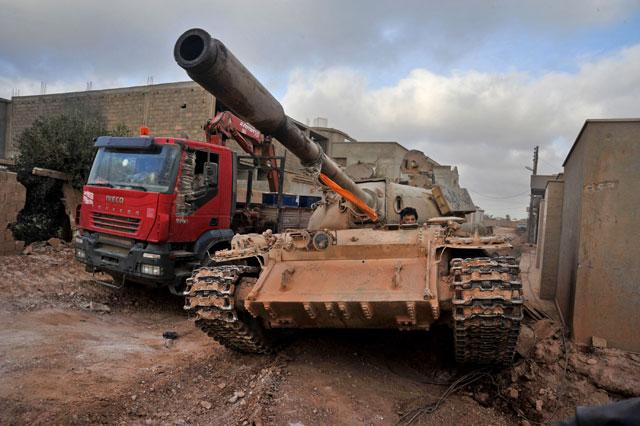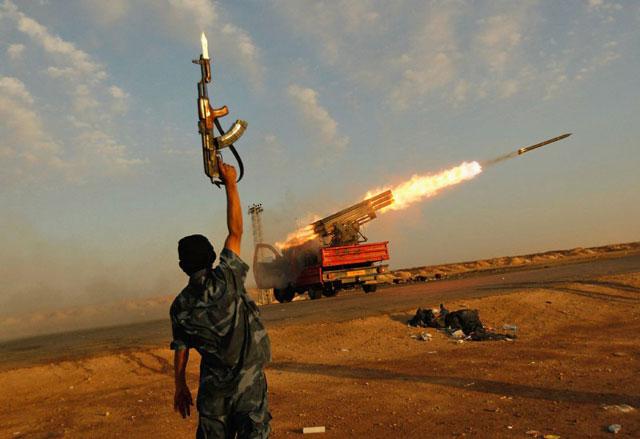You are here
Southern Libya could be new frontier for Daesh — experts
By AFP - Mar 21,2016 - Last updated at Mar 21,2016

In this March 7 file photo, a man loyal to the Libyan armed forces sits in a tank during clashes with the Daesh terror group, west of Benghazi (AP photo)
PARIS — A potentially critical conflict has gone largely unnoticed in southern Libya yet could open up a gateway to sub-Saharan Africa for the Daesh terror group, analysts say.
Daesh has consolidated its hold along Libya's northern coast, and experts are concerned the extremists may now be pushing into the remote desert region of Fezzan in the southwest of the country.
Sitting on the crossroads between Algeria, Niger and Chad, Fezzan offers lucrative sources of income from smuggling and already acts as a hideout for Al Qaeda in the Islamic Maghreb (AQMI) and other extremist groups.
It is one of Africa's main drug routes, traversed by migrants from sub-Saharan Africa hoping to get to Europe as well as by foreign mercenaries, mostly African, heading to join Daesh at their Sirte stronghold in northeastern Libya.
Penetrating south through Fezzan could ultimately help Daesh link up with its brutal Nigerian sister organisation, Boko Haram, as well as providing a rear base in case of any international assault on its positions along the Mediterranean coast, analysts say.
However, the desert region remains something of an intelligence black hole and the extent of Daesh's intrusion is unclear.
For now, the group's priority is holding on to its northern strongholds, said Jerome Tubiana, a researcher with the Small Arms Survey think tank.
"That said, going down towards Niger, forming ties with Boko Haram — the IS [Daesh] arm in west Africa — and competing with AQMI could obviously be tempting for Daesh," he said.
Tribes, criminals, extremists
Extremist groups are able to exploit a complex rash of local rivalries in Libya's southern desert region.
Since the 2011 revolution that ousted longtime dictator Muammar Qadhafi, Fezzan has been embroiled in conflict involving the ethnic Tubus and Tuaregs, as well as two Arab tribes, the Zuwaya and the Awlad Suleiman.
"Military authority [in Fezzan] lies mainly with tribal, criminal and extremist groups," said a UN report this month.
The Tubus are currently in the ascendant in Fezzan after helping to overthrow Qadhafi.
Having been marginalised under the former regime, they now control much of the region’s resources, including recently discovered gold mines spread across the three-way border between Libya, Chad and Niger.
“With the fall of Qadhafi, the Tubus... took control of the borders between these three countries and between Libya and Sudan,” said Tubiana.
That has given them control over much of the local smuggling and trade, and they are fighting for control of oil and petrol stations, he told AFP.
“Their militias have set up checkpoints on the main cross-Saharan roads... transporting food and manufactured goods from Libya and importing livestock from the Sahel,” Tubiana said, adding that contraband such as cigarettes and cocaine also pass through the region.
Regional rivalry
For Daesh, this presents opportunities as well as challenges.
The many local militias means there are plenty of groups who would be hostile to a potential Daesh takeover.
French soldiers stationed in the Sahel Desert are also lying in wait, Tubiana said.
So far, Daesh has carried out few attacks in the region, though analysts say this may be because it wishes to avoid reprisals from the many regional actors who take a close interest in Fezzan.
The Tubus enjoy the backing of the internationally recognised government based in Libya’s eastern city of Tobruk, while their Tuareg and Arab rivals have the support of the Islamist coalition that rules from Tripoli.
Regional powers have also been sucked into the conflict in southern Libya, with the Tubus’ natural ally Chad finding itself in a proxy war with Qatar.
In turn, that has dragged in more Middle Eastern governments: the United Arab Emirates and Egypt side with Chad, while Qatar is supported by Turkey and Sudan.
Daesh “could be concerned about follow-up foreign intervention [air raids] that could weaken the position in the northern regions”, said the TRACterrorism think tank.
Related Articles
Daesh’s executions of Christians show the group is exploiting Libya's lawlessness but tribal and political loyalties and the absence of a sectarian divide mean it is unlikely to grow as rapidly there as in Iraq or Syria.
TRIPOLI — Since Libyan dictator Muammar Qadhafi was driven from power and killed in 2011, the power vacuum has been filled by a multitude of
OUBARI, Libya — In the southern Libyan city of Oubari, shops are shuttered and tension is palpable, as residents fear an imminent incursion


















